Friday 22 March (15:30) GFT Cinema 3 // 1h45m // 15+
Saturday 23 March (10:30) passholders only CCA Cinema // 1h20m // 15+
Saturday 23 March (20:45) GFT Cinema 3 // 1h45m // 15+
Tying in with wider threads throughout this year’s festival (see Jyoti Mistry, Cine Mujer, and Until Liberation 4), the films in our fourth Bill Douglas Award programme explore experimental use of archive, found footage and other existing media, through repurposing them, investigating their alternative possibilities and interrogating their original contexts. And How Miserable is the Home of Evil provides a radical opening provocation to the programme, as footage from the archives of Iran’s Ayatollah Ali Khamenei website, showing the dictator inside a mosque, is paired with with audio from protesters ready to take him down. The split screen experimental doc for here am I sitting in a tin can far above the world looks at YouTube and other found material to explore people’s draw to new speculative technologies, while animation A Kind of Testament is a complex narrative construction that delves into online culture, image appropriation, voyeurism and identity. More puzzle-boxing in Like a sick yellow, which searches through home footage to comment on the fragility of memory and personal history while in the shadow of a war context. Finally, GSFF alumni Total Refusal return with Kinderfilm, wryly using the child-free environment of Grand Theft Auto V to create a somewhat uneasy reflection on an empty future.
Book your tickets on our website here.
How Miserable is the Home of Evil
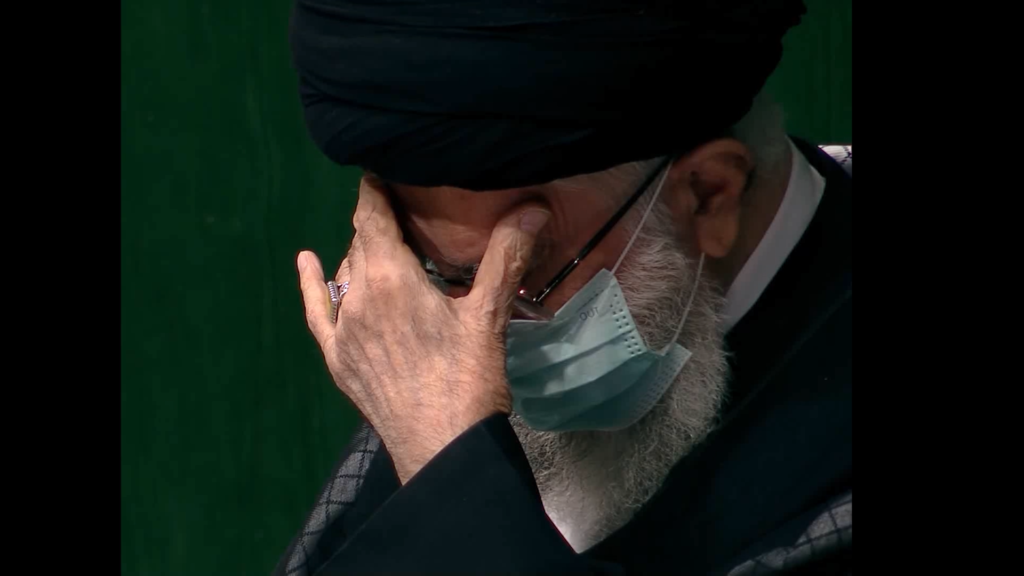
Switzerland // 2023 // 7 mins
The Ayatollah Ali Khamenei takes refuge in a mosque, surrounded by his followers. Meanwhile, the protests outside become increasingly furious and violent.
This year’s GSFF programme includes a range of works that reappropriate archive and found footage as political action, but Saleh Kashefi’s film is one of the most immediate and radical amongst them, and it serves as an unsettling opening provocation for our fourth Bill Douglas Award programme. And How Miserable is the Home of Evil is an experimental fiction, a speculative future in which Kashefi imagines the downfall of Iran’s Ayatollah Ali Khamenei, using footage of the supreme leader taken directly from his own archives juxtaposed with audio from protests. Khameini’s image might be everywhere in Iran as a constant reminder of his control, but in this work we see him isolated, weeping against the sounds of dissent. In reality it is an excerpt from a mourning ceremony during the COVID-19 pandemic, yet here it is reimagined to depict a leader with the revolution on his doorstep ready to topple him. The subversion of using this institution’s own material to suggest its worst nightmare, one in which its power is lost and the collective wins, makes this work key in a programme where we dream of liberation for all. Moreover, the making of a work like this comes with substantial personal risk for the director, now based in Switzerland, and it should spur anyone in a more secure position to reflect on what actions of solidarity can be, when activists and artists like Kashefi are putting themselves on the line for freedom.
Sanne Jehoul
For Here I Am Sitting in a Tin Can Far Above the World
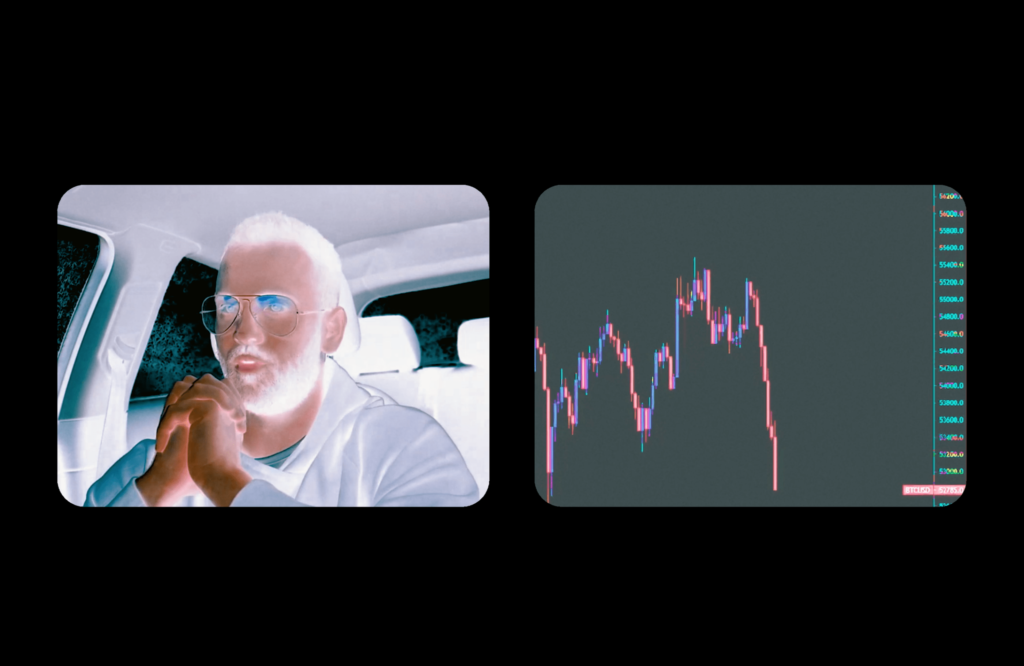
France // 2023 // 19 mins
A woman dreams of a future economic crisis affecting the cryptocurrency market. Thousands are cryogenized waiting for better times. Are they suspended or are they falling into the void?
What is the opposite of nostalgia? Perhaps it’s fear for the future, as Gala Hernández López suggests. In for here am I sitting in a tin can (yes, Bowie’s “Space Oddity”), the experimental filmmaker fleshes out a world of our very current anxieties, the weight of which bends the logic of an abject dreamscape. This dream may be a nightmare, for a dystopian future awaits when a total crash of the Bitcoin market leads many to choose a cryogenic state over waking life, but the soft-spoken voiceover pulsates with longing. Under the reign of technocapitalism, the future is a monetary asset, but the urge to predict—to gain and lose and gain and lose in the process—conceals a need for control. When conversing with Hal Finney, Bitcoin legend, devout extropian, and present cryogenic patient, the young woman addresses him directly: his beliefs, his phrases, his home videos. It is in that need to talk, to ask, and to share, that we see the dualities that make up an ambivalent world, in and out of dreams. Two screens, two voice tracks, colour negatives, and a future tense of vulnerabilities: “Ground control to Major Tom…”
Savina Petkova
A Kind of Testement
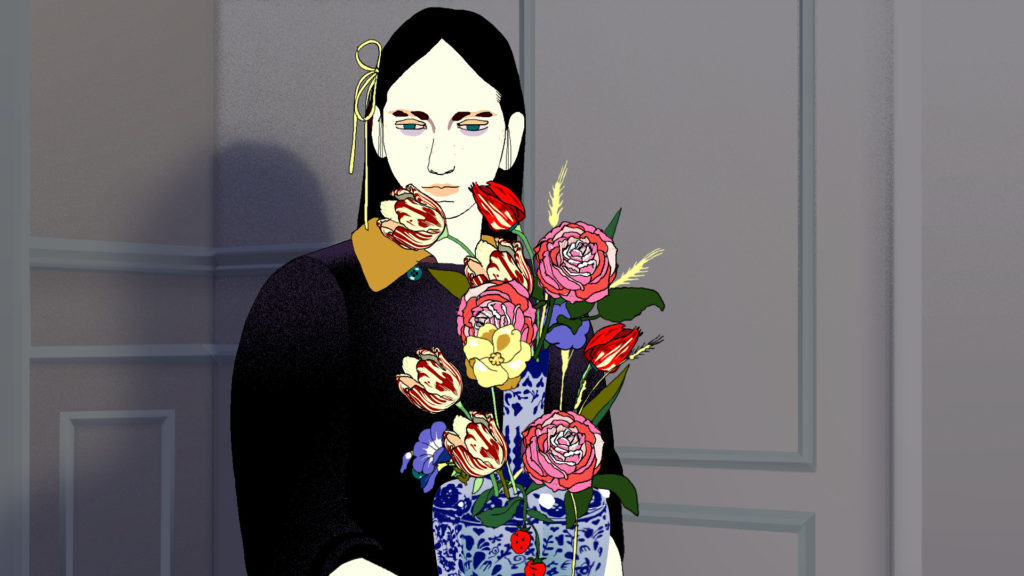
UN GENRE DE TESTAMENT
France // 2023 // 16 mins
A young woman comes across animations on the internet that have clearly been created from her private selfies. An unknown female with the same name confesses to identity theft. But why?
In Legacy Russell’s manifesto Glitch Feminism (2020), we are told that the internet is a place to be whoever we want to be; a digital apparatus with which to re-invent and ‘claim your range’. It is in ironic contrast that Stephen Vuillemin’s A Kind of Testament tells a story of stolen identity, where we see the other, more sinister side of virtual revamping. When one takes inspiration, who is it that we take from? In the bloom and decay of animated flowers we see a woman rebuild and regress, leaving behind a digital garden of non-consensual creations. In the absence of sense there is confusion on one side, yet liberation on the other. Like a delusionary horror story from the depths of the internet, Vuillemin’s own Creepypasta feels like a warning, where our distorted perceptions of online ‘range’ cut deeper than simply a fear of stolen profile photos.
Heather Bradshaw
Like a Sick Yellow
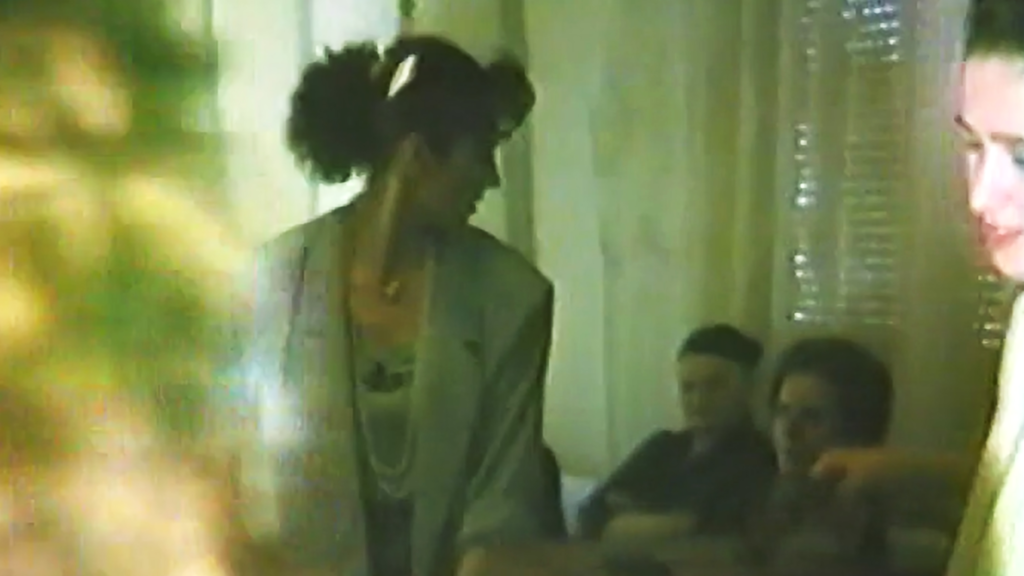
Kosovo // 2024 // 23 mins
Immersion in Nora’s memory, where realities merge, the bad and beautiful become intertwined until it’s all mingled and something else is formed. A tragedy foretold.
Norika Sefa’s film is an eerie contemplation set against the backdrop of the war in Kosovo in the 90s. Composed from an old VHS family archive, it dives into stories (un)told and memories (mis)remembered. Blurring documentary and fiction, Like a sick yellow is a film that eludes interpretation. At the film’s centre is a house – a space where a family gathers for celebrations. A fragmented voiceover of disembodied commentary slowly unfolds. Through rhythmic repetition, we get introduced to these people and this place. Yet, our curiosity is never satisfied. The story of this family is unfinished, evolving and dissolving at the same time. Indeed, the circular form of the film reminds us that – in the face of recurring violence – past, present and future are always interweaving, never allowing enough breathing space to articulate fully. First-person expressions fade into third-person impressions. The line between the individual and the collective is obscured, both through belonging to a community and simultaneously through losing the personal in the face of collective trauma. Who is left to narrate the stories after the ties that hold them together are severed? These histories leave gaps where gestures and silence speak louder than words.
Milda Valiulytė
Kinderfilm
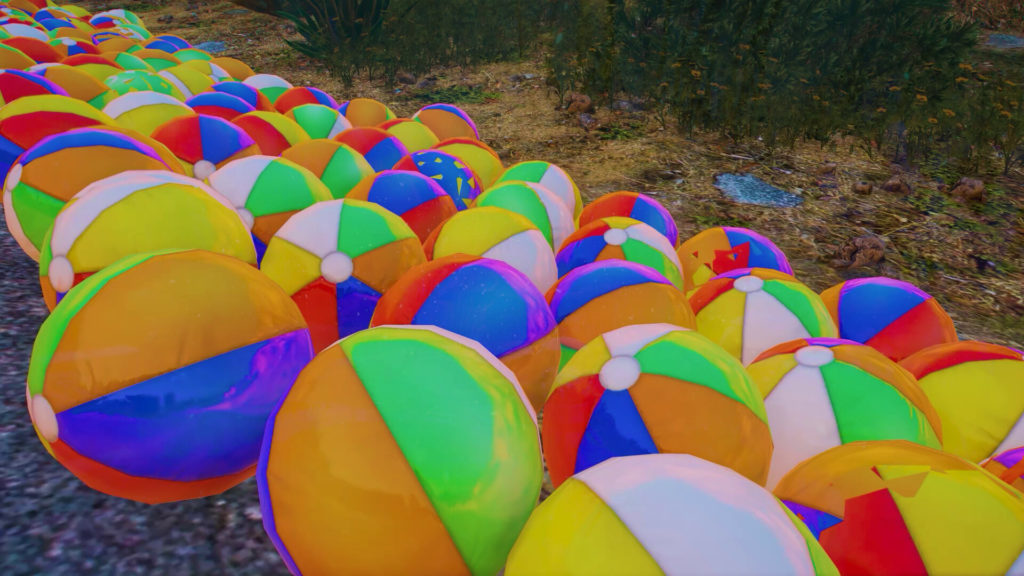
Austria // 2023 // 12 mins
It’s an ordinary day in Grand Theft Auto V. And yet, the car-crowded streets are marked by a grave absence. Searching for clues, Edgar explores the uncanniness of his normality and rediscovers a beautiful yet nightmarish world.
It’s an ordinary day in Los Santos, the world of Grand Theft Auto V, the streets crowded with cars, friends barbecuing in their back gardens or sunbathing on the beach. But, as he drives around town, protagonist Edgar feels a creeping sense of dread, an absence that cuts deeper in certain locations: a darkened toy shop; beach balls in a box, untouched; a silent, empty playground. Kinderfilm is marked by a deep melancholy, highlighting the strangely empty streets of the seemingly huge and sprawling city. The disparate people who populate this lonely world are going solo – men jogging on suburban streets, or staring at their phones, listless – or else belong to eerily silent families, groups of friends sharing food but barely looking at each other. Despite its origins – all the scenes played out within Grand Theft Auto online – Kinderfilm is artful, expansive and cinematic, wisely chosen shots bringing meaning to sometimes crude digital characters. Bernhard Zorzi’s sound design is a standout, bringing an additional sense of emptiness to the already barren city: there’s an eeriness to his depiction of Edgar in a fairground, rides in motion but absent of riders. Adrian Jonas Haim’s music is also excellent, adding a creeping sense of dread to this uncanny, futureless digital world, upping the tempo as the film judders towards its sweet, surreal and strangely touching final sequence.
Michael Lee Richardson